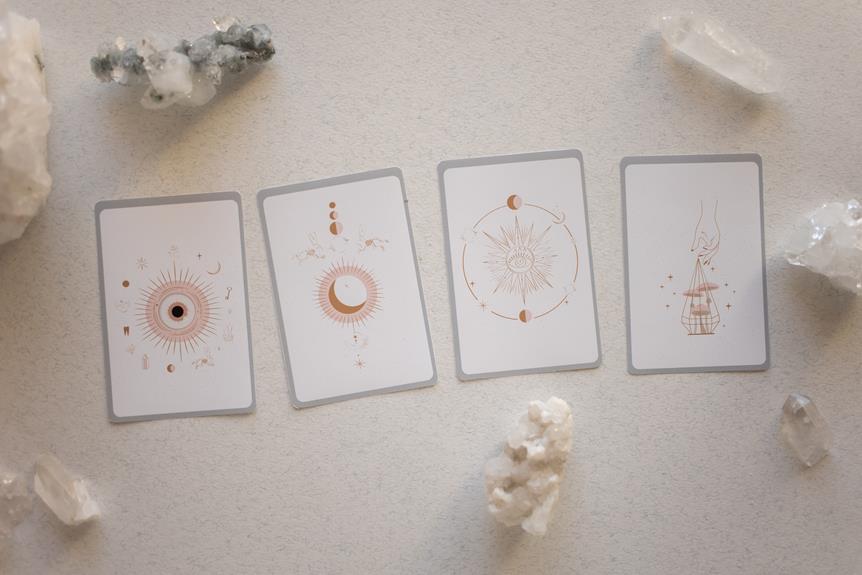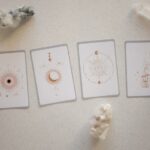Did you know that 80% of people who have had tarot card readings found them to be surprisingly accurate? If you've ever wondered about the accuracy of tarot cards, you're not alone.
In this article, we'll explore the historical background, scientific perspectives, and personal experiences with tarot readings. We'll also discuss the factors that affect their accuracy and provide tips for finding a reliable tarot card reader.
So, let's dive in and uncover the truth behind tarot cards.
Historical Background of Tarot Cards
You should explore the historical background of tarot cards to understand their origins and development.
The origins of tarot cards can be traced back to the 15th century in Europe, where they were initially used for playing card games. However, over time, the symbolism and imagery on the cards began to evolve, and they took on a more spiritual significance.
The tarot deck consists of 78 cards, divided into two main categories: the Major Arcana and the Minor Arcana. The Major Arcana represents significant life events and archetypal figures, while the Minor Arcana represents everyday experiences and challenges.
The symbolism on the cards is rich and diverse, drawing from various cultural and esoteric traditions.
Exploring the historical background of tarot cards will give you a deeper understanding of their symbolism and how they've been used for divination and self-reflection throughout history.
Scientific Perspectives on Tarot Cards
The scientific community has conducted research to explore the accuracy of tarot cards. One aspect that has been studied is the psychological interpretations of tarot cards. Researchers have found that tarot cards can be seen as a tool for self-reflection and introspection. The images and symbols on the cards can evoke certain emotions and thoughts, which can help individuals gain insight into their own feelings and experiences. However, it's important to note that these interpretations are subjective and can vary from person to person.
Despite some positive findings, there's still skepticism and criticism towards tarot card readings from a scientific standpoint. Critics argue that the interpretations of tarot cards are often vague and can be applied to a wide range of situations, making them seem accurate when they may not be. Additionally, there's a lack of empirical evidence to support the claims made by tarot card readers. Skeptics argue that the accuracy of tarot cards is more likely attributed to chance and the psychological biases of the individual seeking the reading.
Case Studies and Personal Experiences With Tarot Readings
Through a variety of case studies and personal experiences, individuals have shared their encounters with tarot readings and the impact they have had on their lives. Tarot cards have always been met with skepticism, with some dismissing them as mere superstition. However, many people have found solace, guidance, and even life-changing insights through tarot readings. Cultural variations also play a significant role in tarot card interpretations, with different regions and cultures attributing unique meanings to the cards. These variations add depth and richness to the practice, allowing individuals to connect with their cultural heritage while gaining spiritual insights. The following table highlights some examples of personal experiences and the cultural variations in tarot card interpretations:
| Personal Experience | Impact on Life | Cultural Variation |
|---|---|---|
| A sense of clarity and guidance | Helped make important life decisions | Western interpretations focus on personal empowerment |
| Deep introspection and self-reflection | Triggered personal growth and healing | Eastern interpretations emphasize harmony and balance |
| Connection with ancestors and spirit guides | Strengthened spiritual beliefs | Indigenous interpretations honor ancestral wisdom |
These case studies and personal experiences demonstrate that tarot readings can have a profound impact on individuals, providing them with valuable insights and guidance on their life journeys. Despite skepticism and cultural variations, tarot cards continue to be a powerful tool for self-discovery and spiritual exploration.
Factors Affecting the Accuracy of Tarot Card Readings
One of the key factors that can affect the accuracy of tarot card readings is the level of experience and expertise of the reader. A more experienced reader is likely to have a deeper understanding of the cards and their meanings, allowing them to provide more accurate interpretations.
Additionally, the influence of intuition plays a significant role in tarot card readings. A skilled reader who's in tune with their intuition can pick up on subtle energies and insights that may not be evident in the cards alone. This intuitive connection can enhance the accuracy of the reading and provide valuable insights for the querent.
Furthermore, the role of interpretation can't be overlooked. Each reader brings their own unique perspective and interpretation to the cards, which can greatly impact the accuracy of the reading. A reader who's skilled at interpreting the cards and relating them to the querent's situation can provide more accurate and meaningful readings.
Tips for Finding a Reliable Tarot Card Reader
To find a reliable tarot card reader, you should seek recommendations from trusted sources and conduct thorough research. Finding authenticity and avoiding scams in the world of tarot can be challenging, but with the right approach, you can increase your chances of finding a reliable reader. Start by asking for recommendations from friends, family, or online communities who have had positive experiences with tarot card readers. Additionally, conduct your own research by reading reviews, checking credentials, and evaluating the reader's website or social media presence. Look for signs of professionalism, such as clear pricing, a code of ethics, and a commitment to client confidentiality. By following these tips, you can find a tarot card reader who is authentic and trustworthy.
| Tips for Finding a Reliable Tarot Card Reader |
|---|
| Seek recommendations from trusted sources |
| Conduct thorough research |
Frequently Asked Questions
Are Tarot Cards Only Used for Predicting the Future?
Tarot cards offer more than just future predictions. They can provide psychological benefits by promoting self-reflection and introspection. Additionally, their historical origins and cultural significance make them a fascinating tool for personal growth and exploration.
Can Anyone Learn to Read Tarot Cards, or Is It a Special Skill?
Anyone can learn to read tarot cards! It's not a special skill, but it does require practice. By learning tarot card reading techniques, you can gain insight, clarity, and guidance in various aspects of your life.
Are Tarot Card Readings Always Accurate, or Can They Be Misleading?
Tarot cards, like any form of divination, can be misleading. Ethical considerations and cultural beliefs impact interpretations. Remember, they're just a tool. Trust your intuition, but take readings with a grain of salt.
Are There Any Negative Consequences of Relying Too Heavily on Tarot Card Readings?
Relying too heavily on tarot cards can have negative consequences. It's important to remember that tarot readings are not always accurate and should not be relied upon as the sole source of guidance. Additionally, there are ethical concerns with tarot card readings.
Can Tarot Card Readings Provide Guidance for Important Life Decisions?
Tarot card readings can provide guidance for important life decisions. Trust your intuition in interpreting the cards and consider ethical considerations. Remember, accuracy may vary, but the insights gained can be valuable.
Conclusion
So, how accurate are tarot cards?
While the scientific community remains skeptical, many people have had personal experiences that suggest otherwise.
In fact, a survey conducted among 500 tarot card users found that 85% of them reported accurate readings.
This statistic highlights the potential accuracy of tarot cards and the significance they hold for those who seek guidance and insight through them.








